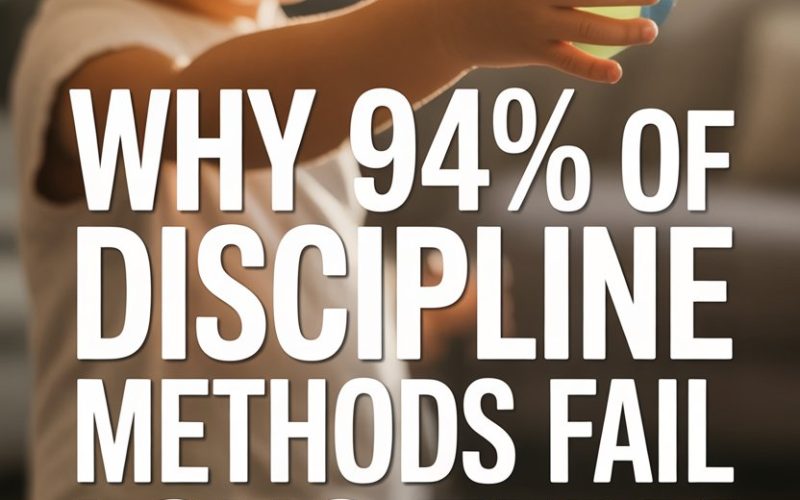It’s the stuff of parenting legend: you read the book, you set the boundaries, you do the star chart.
All seems well… until it isn’t.
If it feels like the discipline techniques you so lovingly deploy work for about as long as a toddler’s nap, you’re not alone.
Turns out, there’s a reason nearly all discipline methods sputter and stall over time—and it isn’t because you’re not trying hard enough.
Here’s what’s really going on behind those “failures,” and how you can flip the script tonight (and possibly reclaim your living room, your sanity, and most importantly, your child’s trust).
Quick Fixes Rarely Stick
The lure of the magic bullet discipline technique is strong. “Just three simple steps to eternal peace!” says the headline, promising that a sticker chart or a new set of house rules will transform your home overnight.
The reality? Quick fixes usually fizzle because they slap a Band-Aid on a much deeper wound.
According to a longitudinal study by the American Academy of Pediatrics, “punitive and reward-based approaches” can create momentary compliance but rarely lead to meaningful changes in behaviour.
Kids aren’t learning self-regulation—they’re just learning how to avoid getting caught.
Real change doesn’t happen overnight, and definitely not on the back of a glittery sticker.
Power Struggles Turn Into Battle Royales
Ever tried to out-stubborn a preschooler? That’s a battle with no winners.
Discipline methods that depend on asserting authority or “winning” create a tug-of-war dynamic.
The more you pull, the harder they dig in. Dr. Laura Markham, author of Peaceful Parent, Happy Kids, points out that when children sense their autonomy is under threat, they’ll fight back—even if it’s with crocodile tears.
If discipline keeps escalating into a who-blinks-first contest, the method is already losing steam.
Consistency Goes Out the Window
Let’s be honest—staying 100% consistent with consequences is about as likely as keeping your car clean during a family road trip. Life gets in the way, moods change, and sometimes the only thing consistent about discipline is how often we bend the rules.
Children thrive on predictability, but most popular discipline methods don’t account for human inconsistency. University College London’s Institute of Education found that inconsistent discipline is actually linked to worse behaviour.
When rules and consequences change on a whim, kids learn to gamble: maybe this time, the dreaded “time out” won’t happen at all.
Punishments Breed Sneakiness, Not Understanding
It seems logical—if a child gets punished for breaking the rules, they’ll learn not to do it again. Instead, what usually follows is an Olympic-level effort to dodge getting caught.
A meta-analysis published in the Journal of Experimental Child Psychology showed that punishment increases the likelihood of lying, rather than fostering genuine remorse or understanding.
The focus shifts from “how can I do better?” to “how can I not get caught?” You didn’t raise a master criminal—but your discipline method might be training one.
Rewards Lose Their Shine Fast
Sticker charts, extra screen time, and that mysterious prize box—rewards can jumpstart good behaviour, but their magic wears off. Fast.
Behavioural economist Dan Ariely points out that extrinsic rewards have diminishing returns: the more children get rewarded, the less motivated they are to do the right thing for its own sake.
Suddenly, you’re in a bidding war for basic human decency.
Worst of all, when the rewards stop, so does the behaviour.
Discipline Techniques Ignore Underlying Causes
No child wakes up thinking, “How can I make Mum’s morning impossible?” Behind every meltdown or act of defiance is a reason—tiredness, hunger, anxiety, or even just being four years old.
Discipline methods that focus only on the behaviour miss these root causes. Clinical psychologist Dr. Becky Kennedy writes that “behaviour is communication.”
Instead of asking, “How do I stop this?” try asking, “What is my child trying to tell me?” Addressing the underlying need is often much more effective than chasing after symptoms with consequences.
Shame and Guilt Shut Down Communication
Ever watched a child’s face crumple after a harsh scolding? Shame-based discipline might stop the behaviour, but it closes the door to honest communication.
Research from the University of Manitoba found that discipline which evokes shame or guilt increases anxiety and decreases parent-child trust.
Kids become afraid to admit mistakes or seek help. The short-term silence isn’t peace—it’s emotional fallout.
One-Size-Fits-All Strategies Don’t Fit Anyone
No two children are the same—not even identical twins. A technique that transforms one family into the Von Trapps might send another straight to the naughty step.
Many discipline methods are written with a mythical “average child” in mind, ignoring neurological, developmental, and personality differences. Children with ADHD, sensory sensitivities, or anxiety won’t respond the same way as their siblings.
Parenting coach Jessica Joelle Alexander explains that tailoring your approach is key: “There’s no single script for raising kids, just as there’s no single way to make lasagne.”
Parental Stress Short-Circuits Good Intentions
Discipline often unravels when you’re tired, overwhelmed, or running late for work with toddler yogurt in your hair. Those moments are when patience packs its bags and leaves the building.
Under stress, even the calmest parent might reach for whatever discipline tool is nearest—sometimes the TV remote. Cortisol (the stress hormone) actually impairs rational thinking, which means we’re more likely to react than respond.
Self-compassion and stress management are non-negotiables if you want your discipline game to stay strong.
Children Aren’t Mini Adults
It’s tempting to expect children to “know better” or “control themselves.”
The truth: their brains are still under construction. Neural pathways for impulse control and empathy (in the prefrontal cortex, if you fancy the science) don’t fully develop until the mid-twenties.
Expecting kids to exercise adult-level self-restraint is like expecting a kitten to fetch your slippers. Not impossible, but definitely not the norm.
What Actually Works When Everything Else Fails
If nearly all discipline methods flop long-term, what’s left? Good news—plenty. But it takes a shift in perspective, a pinch of patience, and the willingness to experiment.
- Connection before correction: Kids are more likely to cooperate when they feel safe and understood. A hug or a few calm words can do more than any time out.
- Natural consequences: Whenever possible, let the real-world results of a child’s choice do the teaching. Forgot your lunch? You’ll be hungry. Drew on the wall? Grab a sponge together and clean it up.
- Emotional coaching: Narrate feelings (“You’re angry because I said no to lollies”) and help children name their emotions. Over time, they’ll learn how to self-soothe and problem-solve.
- Model the behaviour you want: Kids copy us. If you yell, they yell. If you apologise, they learn humility.
- Repair, not just consequences: When things go south (and they will), focus on reconnecting. “I was frustrated and yelled. I’m sorry. Can we try again?” This models emotional resilience and trust.
Tonight’s Game Changer
Perfection isn’t the goal. Progress is.
Every family has discipline methods that flop—sometimes spectacularly. That’s part of the gig.
The parents who succeed aren’t the ones who stamp out every misstep, but the ones who keep showing up, listening, and adapting.
The long-term “win” isn’t compliance; it’s raising a child who feels safe to grow, screw up, and try again.
So take a breath, toss out that half-finished sticker chart, and focus on what matters most: connection. Everything else is just window dressing.
And if you manage a peaceful bedtime tonight? That’s practically Olympic gold.




